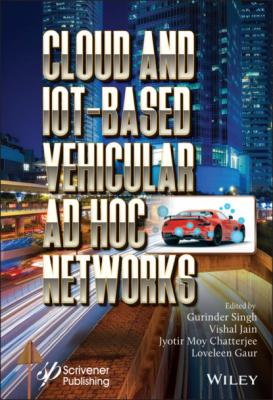Cloud and IoT-Based Vehicular Ad Hoc Networks. Группа авторов
Читать онлайн.| Название | Cloud and IoT-Based Vehicular Ad Hoc Networks |
|---|---|
| Автор произведения | Группа авторов |
| Жанр | Автомобили и ПДД |
| Серия | |
| Издательство | Автомобили и ПДД |
| Год выпуска | 0 |
| isbn | 9781119761822 |
Table of Contents
1 Cover
4 Preface
6 1 IoT in 5th Generation Wireless Communication 1.1 Introduction 1.2 Internet of Things With Wireless Communication 1.3 Internet of Things in 5G Mobile Computing 1.4 Internet of Things and 5G Integration With Artificial Intelligence 1.5 A Genetic Algorithm for 5G Technologies With Internet of Things 1.6 Conclusion & Future Work References
7 2 Internet of Things-Based Service Discovery for the 5G-VANET Milieu 2.1 VANET 2.2 5G 2.3 Service Discovery 2.4 Service Discovery in 5G-VANET Milieu 2.5 Service Discovery Architecture for 5G-VANET Milieu 2.6 Performance Evaluation Metrics for Service 2.7 The Advantage of Service Discovery in the 5G-VANET Milieu 2.8 The Disadvantage of Service Discovery in the 5G-VANET Milieu 2.9 Future Enhancement and Research Directions 2.10 Conclusions References
8 3 IoT-Based Intelligent Transportation System for Safety 3.1 Introduction 3.2 Elements of ITS 3.3 Role of ITS in Safety 3.4 Sensor Technologies 3.5 Classification of Vehicle Communication Systems 3.6 IoT in Vehicles 3.7 Embedded Controllers 3.8 ITS Challenges and Opportunities References
9 4 Cloud and IoT-Based Vehicular Ad Hoc Networks (VANET) 4.1 Introduction to VANET 4.2 Vehicle-Vehicle Communication (V2V) 4.3 Vehicle–Infrastructure Communication (V2I) 4.4 Vehicle–Broadband Cloud Communication (V2B) 4.5 Characteristics of VANET 4.6 Prime Applications 4.7 State-of-the-Art Technologies 4.8 VANET Challenges 4.9 Video Streaming Broadcasting References
10 5 Interleavers-Centric Conflict Management Solution for 5G Vehicular and Cellular-IoT Communications 5.1 Introduction 5.2 Background 5.3 Device Identity Conflict Issue 5.4 Related Work 5.5 Interleavers-Centric Conflict Management (ICM) 5.6 Signaling Procedures for Enabling ICM 5.7 Conclusion References
11 6 Modeling of VANET for Future Generation Transportation System Through Edge/Fog/Cloud Computing Powered by 6G 6.1 Introduction 6.2 Related Works 6.3 Proposed System Overview 6.4 Modeling of Proposed System 6.5 Results and Discussion 6.6 Conclusion References
12 7 Integrating IoT and Cloud Computing for Wireless Sensor Network Applications 7.1 Introduction 7.2 Challenges and Opportunities 7.3 Case Study 7.4 Conclusion References
13
